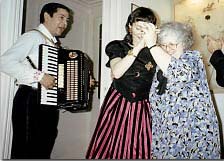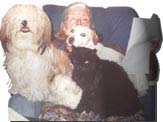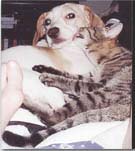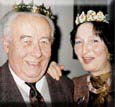|
Louis Castel
A phone call from Louis Castel informed me, one day, that Philip K. Dick had written something about me on the Web, establishing me in the kingdom of the virtual. He told me also that I was probably the only one to have interviewed him in a TV movie – a scoop. Castel, who in 1977 created the Theatrographe in Avignon, produced (in 1993) How to Build a Universe That Doesn't Fall Apart Two Days Later by Philip K. Dick. He showed, in the background, extracts from the filmed interview. We met a little later in Paris, for the French publication of the works by Dick in the pocket collection Omnibus. That very special man, radiant, gave me one of those rare flashes of friendship during which one feels himself on the same wavelength with someone else – a sort of flash of eternity.
Derrick Ceyrac

A talented photographer, at France-Presse News Agency (AFP) for more than thirty years, lover of sailing, Derrick Ceyrac is a Knight of the lost Ark, a cowboy who puts on saddle and spurs inside out, but also the man who will save us in a time of great catastrophe. I owe to him thirteen years (and more) of laughs, growlings and passion, of poetics and wonderful reports together from Ireland to Greece, from Britain to Guyana, and also boarding for the island of Houat, gone with the wind…
Georges Chaffard
We didn’t have long to know each other: Georges Chaffard, international reporter at the Express, asked me to write a book, in the series he was creating by Calmann-Lévy – where he published his Secret Notebook on Decolonization – based on the article I had just written on Magic, in Lui (it was Ave Lucifer) ; he died the day before we were to sign our contract, killed on the road, with his wife (children were injured), by the swerving car… of a friend of my father, Chief Education Officer of a University, returning from Portugal and who fell asleep at the wheel. And to confirm, once more, the adage of Mr de Chamfort about chance (if it were responsible for everything we attribute to it, one could call it God…), it was my own cleaning woman (who was also Chaffard’s maid, unbeknown to me) who told me the news ! Georges Chaffard, as I would learn later, worked a lot on that period of decolonization in Africa and Indochina (then, Vietnam). A researcher of scrupulous honesty, he was far from that type typical of the 80s and 90s, who were fond of denouncing and deriding everything, throwing the baby out with the bathwater. When he received me at that wonderful desk covered in gilt and panelling in rue Auber, he taught me rigour, and precision of dates and questions to be asked. I always regretted the taking of that gentle man, of a remarkable professionalism. I felt, indeed that I missed there, with his death, a precious learning.
Marie-Madeleine Chapuis
 The tango of the student and the (Jungian) analyst… Such was our (very special, in my case) relationship between me and Marie-Madeleine, godmother of my daughter, whom I met one year after my father’s death. I went to see her, the first time, because I wanted to stop smoking (four packs a day) and to write again (I was blocked). Since, I have stopped smoking now for twelve years, I have written four books, founded a new Publishing house company and directed two CD-ROMs. With her head like « Minnie Mouse », her reedy voice (soprano when she is singing), her greed and the way she tells in details everything she has experienced during the day or the past week, the common person smiles with indulgence when meeting her. But the common person has not seen the sharp, thoughtful, grave glance that carries or, rather, re-installs things into the exploration zone of shadows and flashpoint of the unconscious. Poetic, unbearable because she is always right but she expresses it explicitly(after all, you have to find what is hidden), she behaves, from time to time, like a fortune teller – and I love it. We share the same indignations, the same kind of corrosive humour. Thanks to her, anyway, a select few (courageous) people succeeded in reaching the rungs of a certain serenity and made progress. The tango of the student and the (Jungian) analyst… Such was our (very special, in my case) relationship between me and Marie-Madeleine, godmother of my daughter, whom I met one year after my father’s death. I went to see her, the first time, because I wanted to stop smoking (four packs a day) and to write again (I was blocked). Since, I have stopped smoking now for twelve years, I have written four books, founded a new Publishing house company and directed two CD-ROMs. With her head like « Minnie Mouse », her reedy voice (soprano when she is singing), her greed and the way she tells in details everything she has experienced during the day or the past week, the common person smiles with indulgence when meeting her. But the common person has not seen the sharp, thoughtful, grave glance that carries or, rather, re-installs things into the exploration zone of shadows and flashpoint of the unconscious. Poetic, unbearable because she is always right but she expresses it explicitly(after all, you have to find what is hidden), she behaves, from time to time, like a fortune teller – and I love it. We share the same indignations, the same kind of corrosive humour. Thanks to her, anyway, a select few (courageous) people succeeded in reaching the rungs of a certain serenity and made progress.

Charmant
 The dog Charmant was a gift from Marie-Marraine Chapuis to my daughter Charlotte. His godfather is a wonder vet who guesses the souls and diseases of animals and human beings, Michel Granger. Charmant brought up two cats, Tigrée and her sister. Charmant is really a holy man, for a dog. The dog Charmant was a gift from Marie-Marraine Chapuis to my daughter Charlotte. His godfather is a wonder vet who guesses the souls and diseases of animals and human beings, Michel Granger. Charmant brought up two cats, Tigrée and her sister. Charmant is really a holy man, for a dog.
Charles Charras
 « To the most mysterious but nevertheless lucid of my students» was the funny dedication he wrote on the flyleaf on one of his comical-melancholic works, If one wants to look at it like that !, a play first performed on April 2,1986 in Paris. Charras, born in 1920 at Saint-Etienne was one of my teachers at the Dullin theatre training course. He became later, the director of the training school. When I arrived on the stage with long black gloves (Rita Hayworth way !) and a boa around my neck, he taught me patiently to strip off gradually my tawdry rags and to adorn myself with the text only. He taught me also the importance of silence, and of the pause of gesture. . « To the most mysterious but nevertheless lucid of my students» was the funny dedication he wrote on the flyleaf on one of his comical-melancholic works, If one wants to look at it like that !, a play first performed on April 2,1986 in Paris. Charras, born in 1920 at Saint-Etienne was one of my teachers at the Dullin theatre training course. He became later, the director of the training school. When I arrived on the stage with long black gloves (Rita Hayworth way !) and a boa around my neck, he taught me patiently to strip off gradually my tawdry rags and to adorn myself with the text only. He taught me also the importance of silence, and of the pause of gesture. .
Some students of the Dullin Theatre Course, at the time : Jacques Galtier(standing),still producer near Rouen, Michel Souvais (sitting and drawing) still actor, painter and biographer of well-known ladies actresses or writers, Karen Rencurel (on the right) still actress.
Pierre Chaunu
This great historian (Member of Institute, member of the Academy of Sciences and Policy) has been a fan of mine, from my first writings on Ottomane Palestine. Born in August 1923 at Belleville, East of France, Chaunu wrote eighty books, most of them essential to anyone wanting to understand Europe, France, Protestantism or, more generally, modern times. It goes from Conquête et Exploitation des nouveaux mondes (« Conquest and Exploitation of the New Worlds »), in 1969, to the Brève Histoire de Dieu(« A Short History of God »), in 1992, from La Mémoire et le Sacré (« Memory and the Sacred »), in 1978, to Danse avec l’Histoire (“A Dance with History”) (with Éric Mension-Rigau), in 1998. He founded in Caen a Research Centre for Quantitative History in 1966 (using mathematics, statistics, and even demography, to analyze historical evolutions), before teaching modern history at the Sorbonne (from 1971 on). A long time journalist at the daily paper Figaro, he is a man of fundamental beliefs and never hesitates, as he says, to go to preach in brothels: “Why try to convince those who are already convinced?/Why try to convert the converted?”
|



